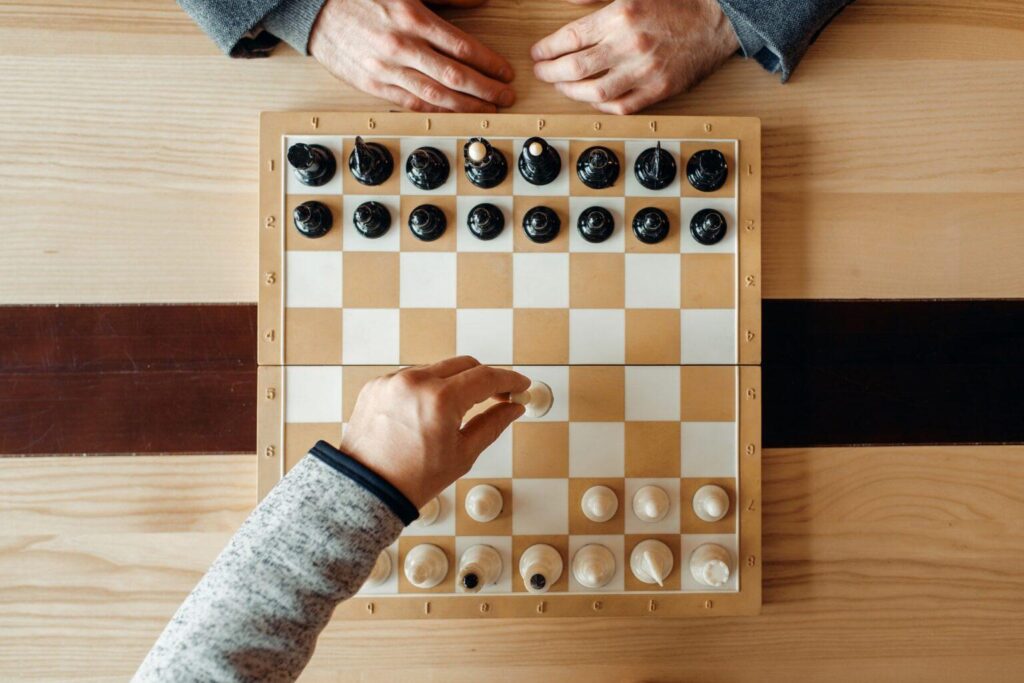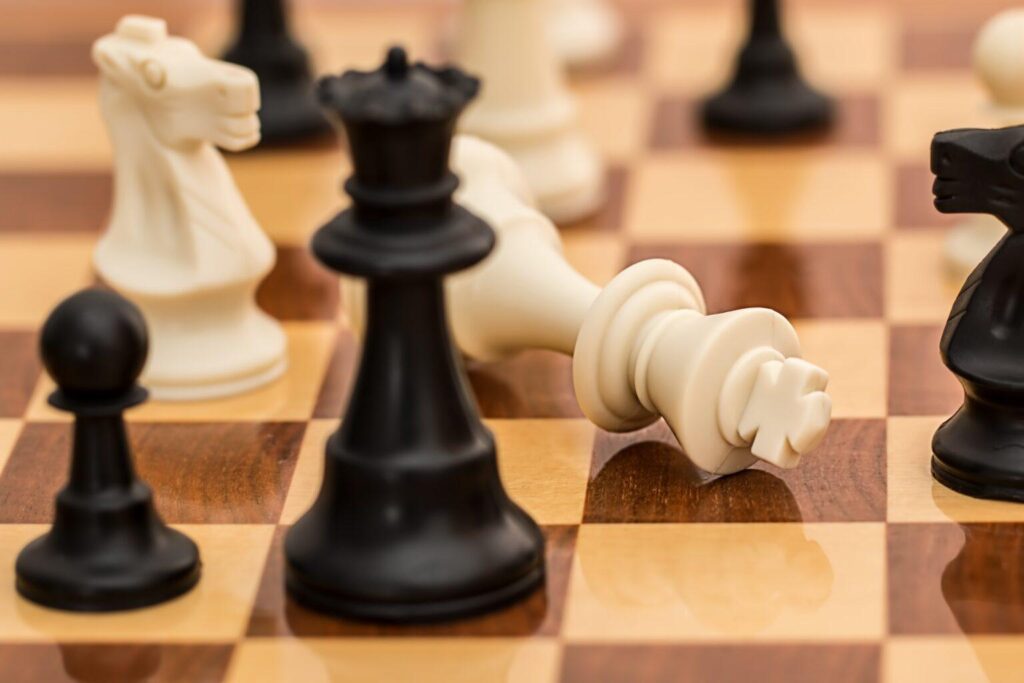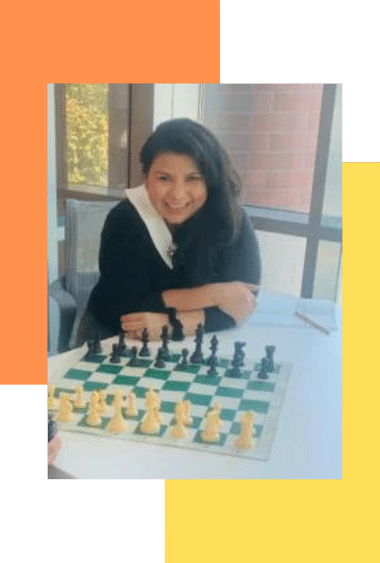Level up: Chesskiddo Masterclasses
NOVICE/BEGINNER CLASS:

This class is designed for children who already know how all the pieces move and capture. It is not intended for first-time beginners.
Chess Curriculum for Novices/Beginners:
Introduction to Chess:
- Learn about chessboard setup and the coordinate system.
Objective of the Game:
- Understand the strategy of checkmate – trapping the opponent’s king for victory.
Gameplay Fundamentals:
- Grasp essential rules, including castling and en passant.
- Understand the concept of stalemate, a draw when no legal moves are available.
- Identify and respond to a “check” – when the king is under threat.
Opening Principles:
- Familiarize yourself with basic opening principles: development, center control, and king safety.
Tactical Awareness:
- Learn fundamental tactics such as forks, pins, skewers, and discovered attacks.
Endgame Basics:
- Recognize foundational checkmating patterns using fewer pieces (e.g., king and queen vs. king).
Practice and Play:
- Engage in regular gameplay to solidify your understanding and enhance decision-making skills.
Algebraic Chess Notation:
- Learn How to Read the Algebraic Notation.
Chessboard Coordinates:
- Understand the coordinates of the chessboard for effective communication during gameplay.
Ethics and Sportsmanship:
- Embrace chess etiquette and recognize the importance of fair play.
After completing this course, you will master all 64 squares on the chessboard and know how to play a game of chess correctly.
Every Chess Master was Once a beginner! – Irving Chernev
BEGINNER/INTERMEDIATE CLASS:

This class is designed for children who already know how to play chess, participate in tournaments, or are interested in competing in chess tournaments.
Chess Curriculum for Beginners/Intermediate Level
Piece Development and Central Control: Strengthen your grasp of piece development, center control, and ensuring the safety of the king.
Position Evaluation Skills: Acquire the ability to effectively assess chess positions.
Decision-Making in Chess: Develop the decision-making process in chess by incorporating reasoning and intuition.
Attacking Strategies: Master techniques to launch successful attacks on the opponent’s king.
Advanced Position Evaluation: Delve deeper into the skill of evaluating intricate chess positions.
Simplifying Chess Pieces: Learn the art of simplifying the arrangement of chess pieces, knowing when and how.
Exploring Tactical Motifs: Explore tactical motifs such as deflection, sacrifice, skewers, pins, forks, and understanding pawn structures.
Basic King and Pawn Endgames: Achieve mastery in the fundamentals of king and pawn endgames, a vital aspect of chess strategy.
Chess Notation Mastery: Attain mastery in algebraic chess notation for precise game recording and review.
Ethics and Sportsmanship: Embrace the principles of chess etiquette and recognize the importance of fair play.
- Tournament Preparation: Engage in chess matches among peers in class, understand tournament rules, time controls, and strategic opening preparation.
- Ethics and Sportsmanship:
- Embrace chess etiquette and value the significance of fair play.
After completing this course, you will be able to confidently play a chess tournament already with a firm grasp of the game and fearlessly participate in city-wide open competitions for beginners.
Get ready for a new world of adventures in chess tournaments, you will make new friends for life and feel proud of everything you have achieved on the chess board and in life.
INTERMEDIATE CLASS:

This class has been designed for chess players with a strong tactical skillset and fundamental knowledge of chess.
Chess Curriculum: Intermediate Level
- The Significance of Rapid Piece Development:
- Grasp the importance of swiftly developing chess pieces.
- Understand initiative and space advantage.
- Advanced Opening Strategies:
- Differentiate between opening principles and opening theory.
- Learning from Typical Opening Mistakes:
- Gain insights from common errors made by less experienced chess players in the opening phase.
- Exploring Classical Chess Champion Games:
- Study games played by chess champions to glean insights into opening strategies.
- Enhancing Position Evaluation Skills:
- Deepen your ability to assess chess positions effectively.
- Decision-Making Process in Chess:
- Master the decision-making process in chess through reasoning and intuition.
- Combination and Calculation:
- Develop accurate short calculation skills to solve complex tactical combinations.
- Positional Understanding:
- Enhance your grasp of key positional concepts, including open files, outposts, and the impact of pawn structures.
- Mastering Minor Pieces:
- Achieve mastery in utilizing and strategizing with minor chess pieces.
- Game Analysis:
- Learn effective methods for analyzing your games to identify strengths and areas for improvement.
- Advanced Chess Notation:
- Deepen your understanding of chess notation for comprehensive game recording and analysis.
- Endgame Strategy:
- Explore strategic choices in various endgame scenarios, focusing on converting advantages into wins.
- Tournament Preparation and Mindset:
- Develop a solid preparation routine and cultivate a resilient mindset for competitive play.
- Ethics and Sportsmanship:
- Embrace chess etiquette and value the significance of fair play.
After completing this course, you will have a solid understanding of the game. Also, you will be eager to play confidently in chess tournament individually and as a team. You could be the one to score the point that determines whether a gold or silver medal is awarded to your team. Some students will already be participating bravely in open competitions held at city-wide events for players their own age, as well as against more experienced competitors.
Start your path to chess mastery right away!
Select Your Chesskiddo Class Choose your monthly class package:
In-Person 45-Minute Class
$109/ Month
- In-Person Group Classes
- 45-Minute Class
- 4 Classes Per Month
- On Wednesday or Saturday
- Students can enroll at any time
In-Person 60-Minute Class
$119/ Month
- In-Person Group Classes
- 60- Minutes Class
- 4 Classes Per Month
- On Wednesday or Saturday
- Students can enroll at any time
In-Person 90-Minute Class
$135/ Month
- In-Person Group Classes
- 90- Minutes Class
- 4 Casses Per Month
- On Wednesday or Saturday
- Students can enroll at any time
Virtual 60-Minute Class
$109/ Month
- 💻 Online Group Classes
- 60- Minutes Class
- 4 Classes Per Month
- On Sunday
- Students can enroll at any time

